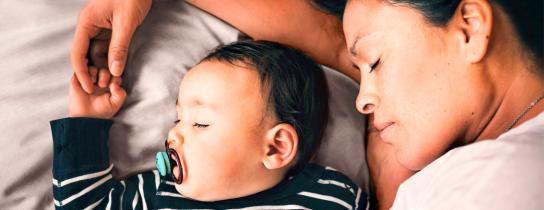
Coughing, sneezing, runny nose: When to take your baby to the doctor
If a baby or toddler has cold or flu symptoms, they may or may not need medical treatment. Here's how to care for them at home and when to seek medical help.
It's common for babies and toddlers to get viral illnesses like colds or the flu from viruses like influenza, rhinovirus and respiratory syncytial virus (RSV).
For babies, colds usually resolve within 7 to 10 days, while the flu can pass in as quickly as 5 days. Coughs caused by viruses can take longer to resolve.
These infections often clear up on their own, and depending on symptoms, may not need medical intervention.
But every cold and flu season, parents of babies are hit with the same difficult question: When to take the baby to the doctor for a cough or other symptoms?
Here's what to expect when babies get sick, and when to see a doctor.
What to expect when a baby catches a cold or the flu
It's common for babies to catch a cold or the flu, especially if they're in day care or often around other children. Children under 6 get sick with about 6 to 8 colds per year.
Symptoms babies commonly experience when they have a cold or flu include:
- Temperature of 99.5¡F (37.5¡C) or higher
- Nasal congestion
- Runny nose
- Disrupted seep
- Mild fussiness
- Cough
- Not feeding like usual
- Not urinating or passing stool as much as usual
Caring for a sick baby at home
When a baby is sick with a cold or the flu, parents and guardians should offer supportive care, keeping them comfortable as they recover.
Parents can make their baby more comfortable by:
- Giving them ibuprofen formulated for babies, but only if the baby is 6 months or older
- Offering them feedings more often than usual
- Giving them less per feeding if they are vomiting
- Avoiding exposure to tobacco smoke, which can make coughs much worse
- Applying ointment around their nose to help prevent dryness, crusting and discomfort
- Using a nasal aspirator or saline spray to relieve congestion
Remedies to avoid
Parents should avoid doing the following when a baby is sick:
- Giving them aspirin
- Giving them honey if they're under 1 year old
- Giving them a sponge bath to cool the fever
When to take a sick baby or toddler to the doctor
If a baby or toddler has a runny nose and cough, they don't usually need to go to the hospital.
However, it's important to watch for signs that a baby's condition is serious and needs medical attention. People should take a baby to the doctor if they show signs like:
- Unusual drowsiness or sluggishness
- Repeated vomiting or diarrhea
- Severe headache, sore throat or ear pain
- Fever with a preexisting condition, such as asthma, heart problems or immune issues
- Seizure
- Temperature above 100.4¡F (38.0¡C) (for babies under 12 weeks)
- Persistent or recurring temperature above 104¡F (40¡C) (for babies over 12 weeks)
- Wheezing or trouble breathing
- Blue lips or face while coughing
It's also a good idea to call a child's pediatrician if their condition worsens or they still seem sick, even when their fever has gone down.
When to worry about a baby's temperature
A fever is the body's way of fighting an infection.
Here are some guidelines for when to worry:
- Call a doctor if a baby is 12 weeks or younger and has a fever of 100.4¡F (38.0¡C).
- For babies and children over 12 weeks, call the doctor if their fever is over 104¡F (40¡C).
The length of time they've had a fever is a factor, too. Call a doctor if:
- A child under 2 years has had a fever for over 24 hours.
- A child over 2 years has had a fever for 3 days or more.
FAQ about coughing, sneezing, and runny nose in babies
Here are some commonly asked questions about cold and flu in babies.
What to do if a baby is coughing at night?
A cough can sometimes worsen at night when mucus drains down the throat. It can become an issue if it prevents a baby from getting a good night's sleep. It's important to know that doctors don't recommend cough medication for children under 6.
Instead, a cool-mist humidifier at night can help loosen congestion and ease dry coughs if the coughing is preventing sleep. Taking a child outdoors for some cool air can help for short periods. Make sure they're dressed well.
What to do about infant congestion and cough with no fever?
If a child is sick with a cough and congestion, helping them feel more comfortable, whether or not they have a fever, is important.
To help relieve infant congestion and cough, people can try:
- Clearing congestion gently with a bulb syringe, nasal aspirator, and saline drops, sprays or rinses.
- Using a cool-mist humidifier to help with dry coughs.
- For children over 2 years old, rubbing mentholated vapor rub on their chest, leaving clothing loose.
Takeaway
It can be overwhelming for parents when a baby gets a cold or the flu, but in many cases, it will go away on its own.
Typically, the best approach to managing the situation is to connect with your child's pediatrician for support and keep the baby as comfortable as possible throughout the illness.
Always watch for signs that their condition might be more serious, like a high fever or trouble breathing.
To further discuss your child's recurring cold or allergy symptoms, schedule an appointment with the highly skilled and compassionate Crystal Run Healthcare pediatric team.

 Optum Radiology at Crystal Run Healthcare
Optum Radiology at Crystal Run Healthcare Same and next-day pediatric appointments
Same and next-day pediatric appointments